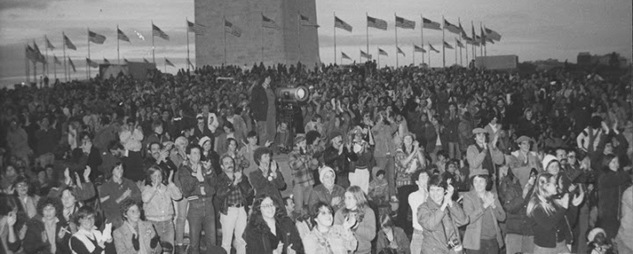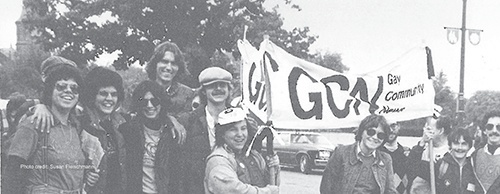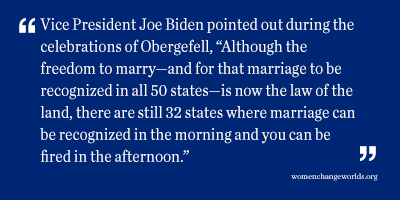
The National March on Washington for Lesbian and Gay Rights took place on October 14, 1979. It was the first march of its kind, and the preparation for it was rocky. The first item on the agenda of the planning conference, held in Philadelphia, Pennsylvania, the previous February, asked delegates to decide whether to hold a march at all. Many were opposed. A “hinterlands caucus” argued that calling attention to the presence of LGBT people outside of cities like New York and San Francisco would jeopardize their safety in the small towns where they lived. Lesbians and people of color were skeptical about whether the march would represent their interests.
In the end, though, the conference endorsed a march, to be organized on a grassroots level, led by a steering committee comprised of 50 percent of women and 25 percent people of color. The national organizations of the time, which were much smaller, poorer, and less influential than the ones we have now, were reluctant to join in, fearing that no one would attend, and that a failed march would be worse than none at all. The National Gay Task Force (now the National LGBTQ Task Force), for example, endorsed the gathering only a month before it was to take place, when it had become clear that people from around the country were going to stream into Washington in large numbers.
The experience was like nothing I’d ever done before. With friends from the weekly Gay Community News, where I was the features editor, I drove in a van to the march. GCN had printed up thousands of special issues that we were planning to distribute to the marchers. Cars passed us, beeping in support and holding signs out the windows. Every highway rest stop was crowded with people like us. The New Yorkers even chartered a special train. In Washington, the metro was crowded with obvious queers from all over the country. And on the day of the march, a huge crowd of us surrounded the Washington monument. The organizers estimated that there were at least 100,000 at the rally; the media, including the Boston Globe, reported far fewer—but it was a victory that they reported on us at all. Our movement had finally grown too big to ignore. (And in an activist response to the Globe’s underestimate, Lesbian and Gay Media Advocates [LAGMA] formed, to push for accurate, unbiased coverage.)
The march had five main demands:
• Pass a comprehensive lesbian/gay rights bill in Congress.
• Issue a presidential executive order banning discrimination based on sexual orientation in the federal government, the military, and federally contracted private employment.
• Repeal all anti-lesbian/gay laws.
• End discrimination in lesbian-mother and gay-father custody cases.
• Protect lesbian and gay youth from any laws which are used to discriminate, oppress, and/or harass them in their homes, schools, jobs, and social environments.
 Thirty-six years later, the social status of LGBT people has changed enormously. Few LGBT people in Montana, say, would worry that a march in Washington, DC, would cause them to be set upon by an angry mob. In liberal Massachusetts, my employer, my neighbors, and my doctor all know I’m a lesbian. I’ve been married to my partner of 27 years since 2003—and my entire family came to our wedding. Since the Supreme Court’s Obergefell decision in June, my marriage is recognized by the federal government as well as that of my state. I can watch many television shows and movies in which LGBT characters make it through the entire plot without killing themselves. I can kiss my wife goodbye on the front steps when I leave for work in the morning without worrying (too much) that we’ll be beaten or shot.
Thirty-six years later, the social status of LGBT people has changed enormously. Few LGBT people in Montana, say, would worry that a march in Washington, DC, would cause them to be set upon by an angry mob. In liberal Massachusetts, my employer, my neighbors, and my doctor all know I’m a lesbian. I’ve been married to my partner of 27 years since 2003—and my entire family came to our wedding. Since the Supreme Court’s Obergefell decision in June, my marriage is recognized by the federal government as well as that of my state. I can watch many television shows and movies in which LGBT characters make it through the entire plot without killing themselves. I can kiss my wife goodbye on the front steps when I leave for work in the morning without worrying (too much) that we’ll be beaten or shot.
Vice President Joe Biden pointed out during the celebrations of Obergefell, “Although the freedom to marry—and for that marriage to be recognized in all 50 states—is now the law of the land, there are still 32 states where marriage can be recognized in the morning and you can be fired in the afternoon.” We have no federal protection from employment discrimination—nor from discrimination in housing, education, public accommodations, credit, federal funding, and jury service. For that kind of protection, we would need the federal Equality Act: the Comprehensive LGBT Nondiscrimination Bill. It has more than 200 sponsors—but it’s a little hard to imagine it getting anywhere, given everything else that is jammed up in Congress. Last year, after the Supreme Court’s Hobby Lobby decision, LGBT groups gave up even on the more limited Employment Nondiscrimination Act (ENDA) after pushing for it for twenty years, since the court decision would have opened the door to endless religious exemptions. (Maybe none of this is surprising, given that the US has not yet been able to pass a women’s Equal Rights Amendment.)
 Still, as you may remember how the ban on discrimination in the military worked out. We had Don’t Ask, Don’t Tell, which was considered a step forward when it was enacted in 1993, because it prevented service members who were LGBT, or thought to be, from being automatically discharged. It was finally repealed in 2011, and the military is now forbidden to discriminate—although the situation of LGBT people who were kicked out with less-than-honorable discharges still remains to be resolved.
Still, as you may remember how the ban on discrimination in the military worked out. We had Don’t Ask, Don’t Tell, which was considered a step forward when it was enacted in 1993, because it prevented service members who were LGBT, or thought to be, from being automatically discharged. It was finally repealed in 2011, and the military is now forbidden to discriminate—although the situation of LGBT people who were kicked out with less-than-honorable discharges still remains to be resolved.
We did get that executive order we wanted—just last year. And we got rid of anti-lesbian and gay sodomy laws—but only after a long slog that required not only overturning antiquated state laws but also the Supreme Court’s 1986 Hardwick decision upholding Georgia’s sodomy law. The court overturned Hardwick in the Lawrence v Texas decision—in 2003.
Even child custody, which you might think had been resolved by equal marriage, continues to complicate the lives of LGBT parents and their children. Recently, “officials in Iowa refused to list the biological mother’s wife on the birth certificate of the child they had conceived through donor insemination. Iowa officials argued that the law recognizes the biological and ‘gendered’ roles of ‘mother’ and ‘father,’ grounded in the biological fact that a child has one biological mother and one biological father.” Back in 1993, the feminist science studies scholar Anne Fausto-Sterling wrote that “sex and gender are best conceptualized as points in a multidimensional space”—but Iowa hasn’t yet gotten the message. Wait until it has to tangle with the multidimensional space of gender nonconforming parents and children.
The protection of LGBT young people that we demanded in 1979 is in some ways the most depressing item on the list to contemplate. Of course, in some communities, LGBT youth can find gay-straight alliances, supportive peers and adults, and even church groups, none of which existed for the friends I marched with in 1979, some of whom had been beaten, institutionalized, or simply abandoned by their hideous, homophobic families. But LGBT youth are still disproportionately likely to become homeless because they’ve been rejected and kicked out by family, abused, or neglected. This of course leaves them vulnerable to lifelong poverty and trouble, because they lack education, access to resources, friendship, and support.
I recently asked the activist and writer Urvashi Vaid about why we haven’t progressed farther—at a moment when, as she put it, “some people are acting though the movement is over, and we won.” Equal marriage, she said, “is only a partial victory… The lesson from every civil rights movement is that formal legal equality doesn’t completely address people’s problems. Our community is incredibly diverse, in terms of age, race, nationality, geography, immigration status, gender identification, all kinds of parameters. We have to look at people’s lives through many lenses.” She is currently leading an effort to address income inequality in the LGBT community—because despite the stereotype of the rich, white, gentrifying gay man, many LGBT people are far less economically secure than their straight counterparts, and their children are more likely to live in poverty. LGBT people continue to experience discrimination, legal run-ins, violence, homelessness—basically, all the issues we were fighting to change back in 1979.
As the late Yogi Berra famously said, “It ain’t over till it’s over.”
Amy Hoffman, M.F.A., is editor-in-chief of Women’s Review of Books published by Wellesley Centers for Women and Old City Publishing. A writer, editor, and community activist, she is the author of three memoirs including, An Army of Ex-Lovers: My Life at the Gay Community News, about Boston’s lesbian and gay movement during the late 1970s, which was published by the University of Massachusetts Press in 2007.
When you subscribe to the blog, we will send you an e-mail when there are new updates on the site so you wouldn't miss them.
Comments